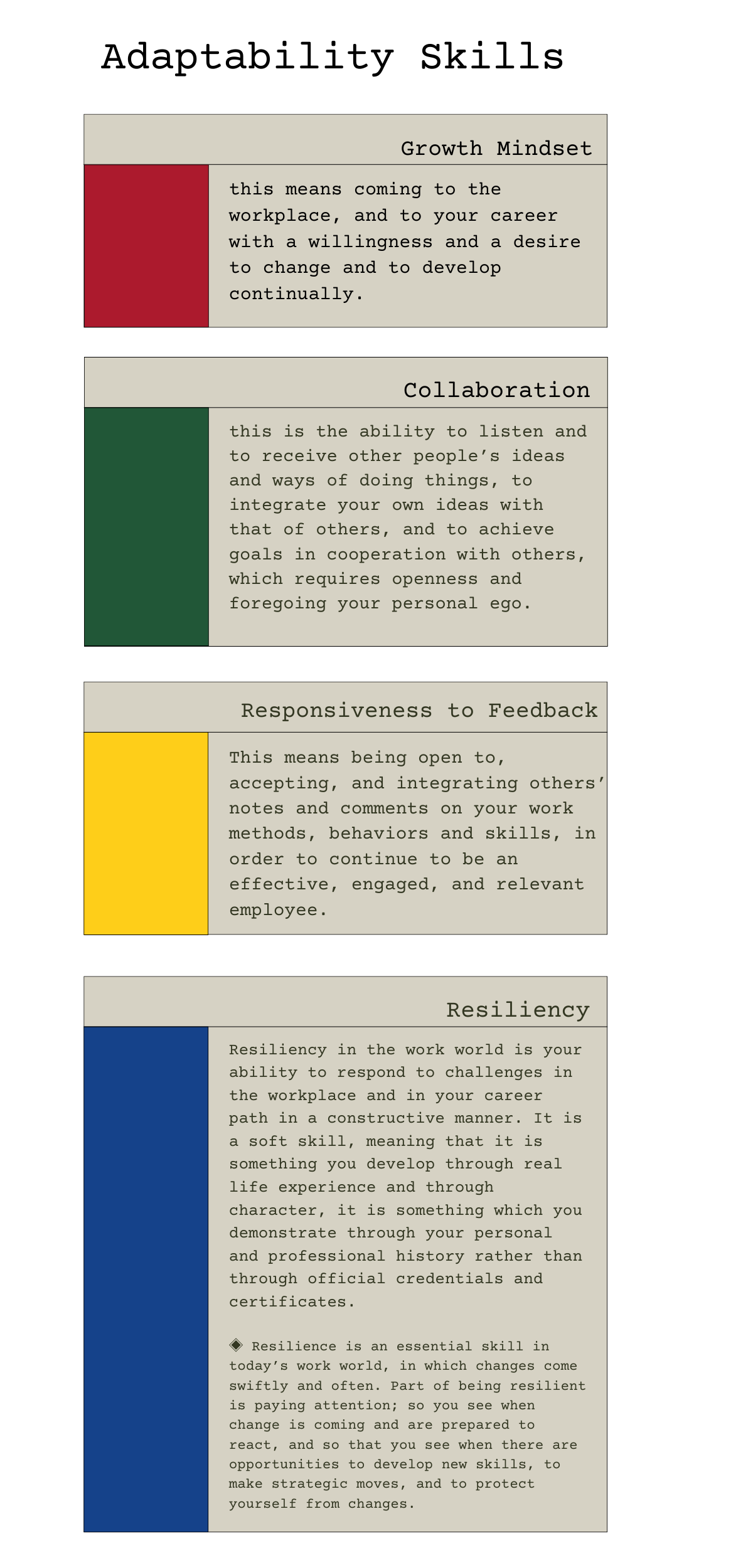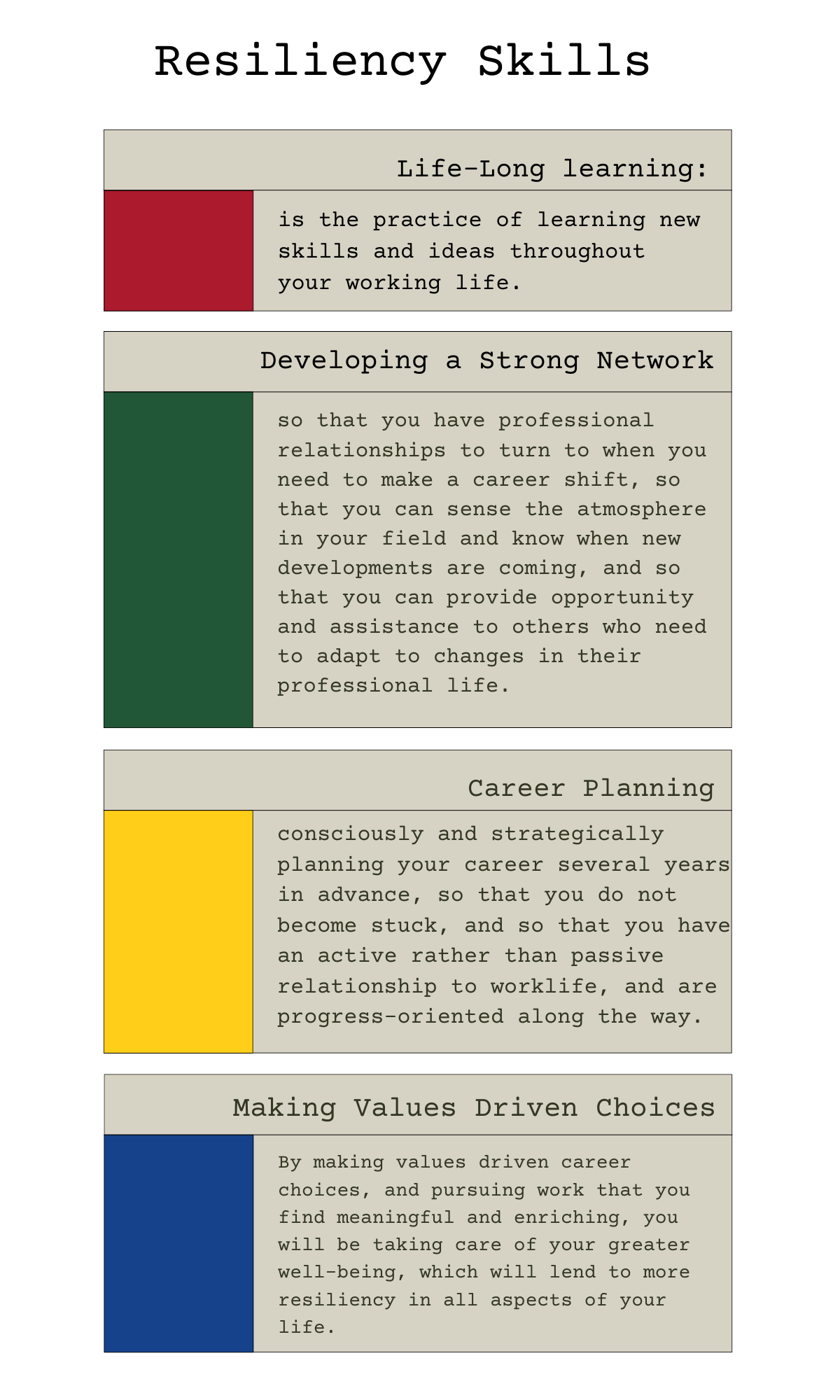The American Labor Market
In this section you will find an overview of the American work world, some themes and characteristics that define it, and some good things to keep in mind as you join the workforce.
✳ The American Labor Market:
The American Labor Market is changing due to the state of our climate, the development of new technology, shifting consumer demands, and the advent of remote work, among many other things.
This means that the kinds of skills and credentials which are most useful in the labor market, as well as the regions with the most opportunity, are also changing. This will be good to keep in mind as you plan your future and strategize about navigating the job market.
What does economy mean?
‘Economic context’ means the system of trade and labor in which wealth is made and moved within a population or system, such as a country, state, or community. As a person in the world you live in many economic contexts, or economies, ranging from your household, to your town or city, to your country, and so on.
The Economy is a system, like an ecosystem, in which resources circulate through the system, and are used, changed, and passed along through the participants in that system in a cycle. In an ecosystem the resources might be water, air, and soil, while in an economic system, the resources will include natural elements, like water, trees, solar power, and so on, but it also includes money, labor, time and much more.
We live in a multiple economies, from the local Kingston Economy, to the Ulster County Economy, the larger Hudson Valley Economy, and the American Economy. The economy is where you will get what you need to live, in return for what you give, such as your money, labor and time. When you choose a professional path, you are choosing a certain relationship to the economy.
Hudson Valley Job Sectors: As of 2018, 84% of jobs in the Hudson Valley are in the Private Sector, while 16% are the Public Sector. → the Hudson Valley Nonprofit sector is a significant private employer in the region, and accounts for more than 50% of jobs.
∗ When considering what kind of training or academic focus to pursue as a young adult, it will be helpful to consider what industries there are in the Hudson Valley; which are growing,
and which are declining, as this will indicate where there will be jobs available.
Changing Industries in the U.S. Economy:
Experience Based Retail: This is a form of consumption which is growing the U.S. economy, and responds to American’s desire to spend money on experiences rather than material goods. Experience Based Retail includes such activities as cultural events, social dining, novelty outdoor experiences, and more.
∗ This also reflects a decline in previous consumer preferences for in-person material goods retail. Due to online shopping, the demand for malls and box stores is decreasing.
The manufacturing industry: is, in fact, not declining in the U.S.; the auto-manufacturing sector in particular has grown in recent years. However, this industry is growing specifically due to automation and new technology, which means that the number of employees required by the manufacturing industry is not growing. The output of the manufacturing industry has grown, while the number of jobs has decreased significantly.
The Green industry: Green industries are those industries which are evolving alternative systems, energy sources and ways of living. In the last 10 years, the green industry has grown by over 20%, meaning that it is a rapidly and steadily growing industry. Jobs in non-renewable energy are not growing at nearly the rate that jobs in renewable energy are.
∗ As the green industry continues to grow, and green alternatives to non-sustainable systems, energy sources, and ways of life are replaced by climate conscious alternatives, these will become the defacto rather than the alternative industry.
The rise of the green industry is resulting in the rise of what are called ‘green skills’ which are those skills which serve the goals of renewability and sustainability. In many vocational programs there will be an option to receive additional instruction in ‘green methods’ which will help trade workers to transition into the green economy. In coming years these skills will be indispensable as the market comes to prefer green methods to traditional ones.
The Future of the American Economy
An Economy in Transition: The American economy is transitioning into a new stage of automation. The changes entailed by this transition will result in an unstable work world. Local policy and businesses will have primary roles in determining how their region handles this transition, and so the condition of the economy and labor market will vary based on how those state, county and city governments choose to regulate the economy and the automation of work and whether they offer job training and education opportunities to those displaced by the changes in the labor market.
◈ Those most likely to be displaced by the changes in the economy will be those with least education. Likewise, middle-wage jobs will continue to become more scarce, meaning that workers must acquire more qualifications in order to access well-paying jobs.
◈ For more information on automation and the American economy, especially as it pertains to the future of work, see section further in document.
Niche Cities: The increase of population and jobs in small metropolitan centers and regions, such as Kingston, will increase, provided niche industries, such as academic institutions or healthcare institutions of high-repute, take root in the area.
Knowledge Workers: A knowledge worker is someone whose primary capital in the labor market is what they know. This means that they have sophisticated expertise in a critical field, such as engineering, architecture, medicine, law, education, research, and more. Knowledge workers' most essential skills are critical and creative thinking. These workers are among the most educated and highest paid in the workforce.
Adaptation, Adaptability, and Resiliency
There are no stable jobs any more, in the sense that the contemporary American worker should expect to change jobs every few years, and to be engaged in learning and skill development throughout their career. The most essential skills will be adaptability and awareness.
∗ It will be essential to be aware of what and when there are opportunities to develop new professional skills through programs provided by the government or your employer, in order to continue in your chosen field, or move into a new one.
This instability is a result of the sheer pace of the modern world and the constantly evolving technology which supports it: as technology changes new skills are required, old skills are obsolete, and jobs are created and disrupted in a continuous cycle of evolution (the true value of which may be questionable).
Adaptability: Adaptability is how flexible you can be to changes which cross your professional path by adjusting your goals, skill-set, or plans in response to new information, challenges and ideas.
Adaptability is a soft skill, meaning that it comes from experience and character rather than official training and certification, it can be demonstrated but it cannot be quantified. Being adaptable means being open minded and receptive to new ideas and ways of doing things, which is especially important in a technology driven economy.
Being an adaptable worker also means taking advantage of opportunities to develop new skills, staying current in your field, and accepting that your initial skills and ways of doing things may no longer be the right way, that the career you intended as a young adult may no longer be possible – or even exist– twenty years later, and so on.





